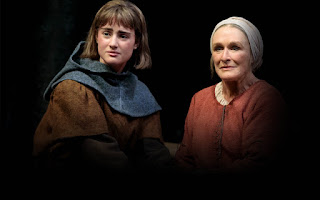Theater Review: Glenn Close as Joan of Arc's Mom
Mother of
the Maid
Written by Jane Anderson
Directed by Matthew Penn
Starring Glenn Close
The Public Theater, Manhattan
September 30, 2018
Mother of
the Maid had the feeling of a star vehicle written for Glenn Close. It is
basically a “what if” play, in which we are asked to see a condensed history of
Joan of Arc through the eyes of a pretty normal mother. I suppose one intent is
to de-mythologize the famous, a pretty typical theme these days. Another is a
more familiar attempt to show the power of family bonds, no matter what the
situation. For me the best scene occurred in the dungeon where Joan was chained
by the English, minutes before her burning at the stake. Mom (Glenn Close) was
in there with her, comforting her, attending to her creature comforts, trying
to provide solace. This was where the play was at its best, as Joan became a
vulnerable girl about to endure an unspeakable torture, and her mother resolved
to do whatever it took to make her experience less excruciating. Close here
showed enormous warmth and empathy that radiated throughout the smallish
wrap-around theater. Elsewhere, the play consisted of a history of Joan, as
explained or described by others, along with the responses of her mystified
parents. The playwright did a good job of balancing the acceptance in the
middle ages of visions and miracles as a normal thing with the incredulity of
the parents that her daughter’s talking with St. Catherine was really that big
of a deal, certainly not enough to dress up in men’s attire and run off to try
to lead an army, thus ruining her local prospects for marriage. The problem was
that there were just a few too many scenes that felt like an old comedy sketch
I remember about Adolf Hitler’s mother-“Adolf, I know you are busy invading the
Soviet Union and killing millions of Jews, but can’t you ever write your mother
or wear clean underwear?”. The play’s text similarly dances on the edge of
comedy, but is not really funny enough to take us all the way there, and
playwright Anderson does not really have enough ideas to sustain the two hour
length. She’s written five prior plays, but mostly writes for TV and some
movies, with a few TV writing/directorships (e.g. the HBO film Normal about a man’s gender transition).
The play had a TV movie feel to it, not quite probing depths or expressing
creative language that might have made the play elevate to a higher level.
Glenn Close was excellent, in spite of several memory lapses that
she handed with the poised aplomb that only dominating stars can. She
demonstrated a wide dramatic range from anger to profound sorrow, delivering a
pretty classic old-school star turn. One of the great things about off-Broadway
theater is the occasional chance to see a mega-star up close in a small
theater, and I enjoyed this one, despite the not-outstanding material. Her
co-cast was excellent, filled with appropriate role players that created their
own moments while not pushing in on Close’s dominating role. Matthew Penn’s
direction was crisp, with good stage movement, avoidance of gimmicks, and
blocking that effectively focused attention on the central characters. Since
the characters were either peasants from the Meuse area in northern France or
royalty, he faced a decision on how to have them speak English. Oddly, he let
the “peasants” choose their own accents, which ranged from Irish to North
Dakota in style, and there was not quite enough contrast with the aristocratic
speech, either in the script or its execution. This was a significant error,
since the story of Joan relies on class distinctions (she is used by the king
to achieve transient victory, then thrown to the wolves (English)). The
minimalistic sets and lighting were effective at setting the characters in the
fore with minimalistic style—e.g. the dungeon was just a dark space with a
chain coming out of one wall, attached to Joan. This was an entertaining, if
ultimately superficial afternoon at the theater, but was a nice chance to see a
star doing her turn.

Comments
Post a Comment